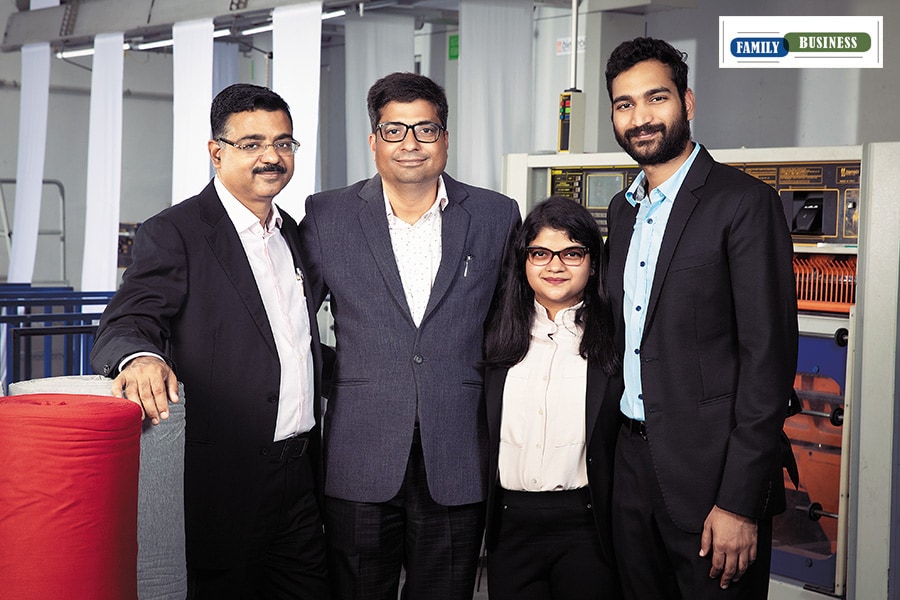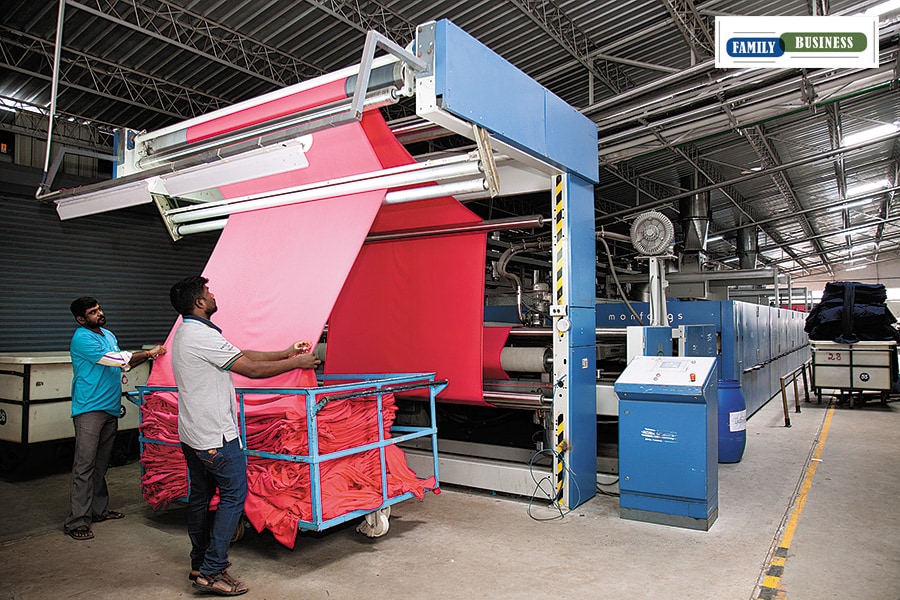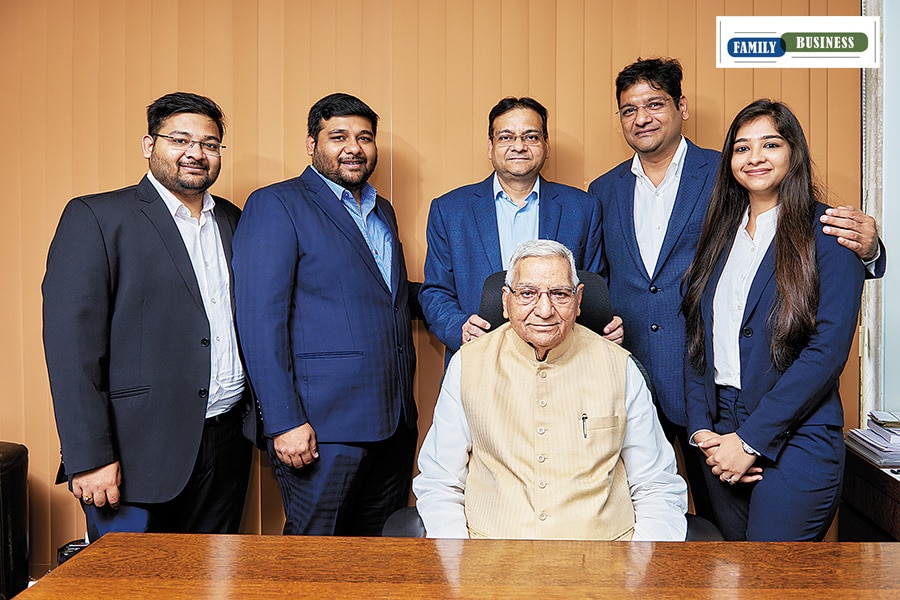How the Guptas took Dollar innerwear close to Rs1,000 crore revenue
Can the third gen now push it on to a faster growth trajectory?


 From left: Binay, Bajrang, Pallavi and Gaurav Gupta
From left: Binay, Bajrang, Pallavi and Gaurav Gupta
Image: Jaison Samuel[br]February 2017. Eight months into the family business, Pallavi Gupta was getting ready for a production meeting with the tech team of Dollar Industries, the makers of men’s innerwear brand Bigboss that is endorsed by Bollywood actor Akshay Kumar. The third generation entrepreneur started her innings in Dollar Industries by fixing nagging issues in the human resource (HR) department and modernising it. Now the next big task for the HR vice president was addressing a bunch of over 10 men. The 21 year old had aced the art of smartly negotiating, boldly dealing with and confidently addressing hundreds of men since June 2016. So, what was the big issue in talking to a bunch of men? Pallavi explains her predicament. “Saying words like panties and slips (camitose) in front of men was embarrassing to begin with,” she recalls. For a young girl, who was not used to talking about or discussing such topics even with her family members, the plight was understandable. Holding a panty in your hand, and showing the production team the changes you want in the product was not easy. “But I didn’t have an option,” she says.
Turned out that the men were at ease listening to her talking about how to scale up Missy. The womenswear brand was launched in 2010, the odd one out in the galaxy of Dollar Industries, dominated by menswear label Bigboss. In 2016, Missy had a turnover of some ₹44 crore, nothing to crow about after six years. Pallavi now wanted to take a stab at scaling up Missy.
The task, though, was not easy. The marketing executives were armed with excuses, and others in the team had their own version for the below-par performance of Missy. Binay Kumar Gupta, Pallavi’s father, came up with a golden piece of advice: Go to the market to find out the issue. Spending the next few months across the country and talking to retailers and distributors, Pallavi focussed all her energies on pushing Missy. The move worked. While Missy’s revenue for the March-ended fiscal jumped to ₹84 crore, the number of stock keeping units or SKUs increased from 10 to over 40. Pallavi is not content. “Lingerie is the next range to be rolled out,” she says. Thought the plan has got delayed due to Covid, the brand is on track. “Being a woman I thought I would understand the need of the brand better,” she says.It’s not only Pallavi who figured out the white spaces in the family business. Four other from the third generation joined the business from 2014 onwards, and chipped in with their contributions. While the first ones to take the plunge were Ankit and Gaurav, Aayush and Pallavi followed suit in 2015 and 2016. The youngest, Vedika, joined in 2018. Net sales are up by 9.18 percent on a compound annual growth rate basis in the four years to fiscal 2019, at ₹969.32 crore. Profits more than doubled from ₹26.35 crore to ₹59.45 crore during this period.
Back in 1991, it was a different story, though. Dollar, then Bhawani Textiles, was struggling to make money. The founder, Dindayal Gupta, came to Kolkata from Haryana in 1962. Over the next decade, he worked with a couple of companies in the hosiery industry, and started Bhawani Textiles in 1972. In 1986, when Binay Kumar Gupta, Pallavi’s father, joined the family business, the revenue was around ₹30 lakh. The role of the 18 year old was to help his father. “That’s what sons were supposed to do in the old model of proprietary business,” he recalls. Over the next five years, Binay did his best to scale up the business, which was facing a tough fight from the likes of Rupa, Lux and Dora.
The Guptas badly needed some spark. And it did come during a Diwali dinner meet in 1991. Eldest son Vinod Gupta, a chartered accountant who worked with Sony Orson and independently filed audits for the company between 1987 and 1991, was asked by his father to join the business. “Why don’t you put your professional expertise into the family business and scale it?” his father asked. Vinod quit his professional career and joined the family business.
The first major change was to computerise the entire operations. “If you recall early 1990s, computers had made a big-bang entry,” says Vinod, now managing director of Dollar Industries. The business, though, needed a much bigger reboot in terms of mindset. “I knew I had to take a huge risk to make it big,” he recounts, adding that his father was content with a conservative approach. Vinod pushed the envelope. Retailers and distributors were offered credit facilities for a few months. The risk, and concerns of his father, were genuine: What if the money got stuck? Vinod persisted. Along with offering credit, he dished out more margins to retailers and rolled out extensive marketing across the country. The move paid off. Sales increased. The brand started making heady progress. “This was the first turning point,” he adds.
 Dollar hosiery unit in Tirupur, Tamil Nadu
Dollar hosiery unit in Tirupur, Tamil Nadu
Image: Courtesy Dollar[br]
The second turning point came in 1998, when Vinod took over 140 distributors to Manali for a business conclave. Next year, the location changed to Goa. After two years, Vinod took over 200 to Kathmandu. While the distributors loved the pampering, Vinod smartly extracted his pound of flesh. Retailers and distributors were asked to sell only Dollar. “It was a big push,” he says.
But what tilted the scales heavily in favour of the brand was when Dollar roped in superstar Salman Khan as brand ambassador in December 2005. “We not only grew at an exponential pace nationally, but also expanded globally,” claims Vinod. There was no looking back for the next five years. In 2010 came a bigger push in the form of actor Akshay Kumar, who continues to endorse the brand. Standing from left: Aayush, Ankit, Vinod, Krishan and Vedika Gupta, with Din Dayal Gupta (sitting)
Standing from left: Aayush, Ankit, Vinod, Krishan and Vedika Gupta, with Din Dayal Gupta (sitting)
Image: Supratim[br]What also helped Dollar was an aggressive footprint ramp-up over the last decade. While it has over a 1,000 distributors now, the count for retailers has touched 1.25 lakh across India. “The target is to take it to 4 lakh over the next few years,” says Vinod, who also attributed the success of the brand to its name. In a market cluttered with Rupa, Lux and the Doras of the world, Dollar stood out in terms of its appeal, and familiarity. “It’s the most popular and widely circulated currency,” he says. “Everybody knows dollar. We didn’t have to try hard,” he says.
Dollar, reckon brand experts, operates in a category where commodity items have acquired brand names that range from the sublime to the ridiculous. But they stand out. Lux is the name of a soap brand, Amul is the name of a butter, and Dora is neither here nor there. “Dollar too stands out in terms of its name. And along with execution and advertising, it has become a big hit,” says Harish Bijoor, who runs an eponymous brand consulting firm. The challenge, though, for Dollar is not bringing all brands under the same roof: The latest rebranding by Dollar Industries has clubbed all products under the Dollar brand name. So it’s either Dollar Man, or Dollar Woman or Dollar Kids. “It can’t be one size fits all,” says Bijoor. Dollar stands more for masculinity in terms of the dominance of Bigboss, which still makes up for over 45 percent of sales, according to an investor presentation by the company for the first quarter results of fiscal 2021.
The threat of ‘one brand for all categories’ might take a toll on Missy, which has massive headroom for growth in intimate-wear, sleep-wear and lounge wear segments. “Missy can become the thrust of the next phase of growth for the company,” reckons N Chandramouli, chief executive officer of Mumbai-based marketing and branding agency TRA Research. In terms of brands, Missy had the second biggest contribution (9 percent) to Dollar Industries in the first quarter. The brand extension of Dollar to Missy does not bring the entire feminine charm that is much needed in this segment, says Chandramouli. Dollar, he adds, still has a strong men’s connotation.
Meanwhile, at the manufacturing plant at Tirupur, Pallavi’s fixation with quality has made her a threat among production officials. “Glad to know that the men are scared,” she laughs.
First Published: Sep 18, 2020, 09:57
Subscribe Now